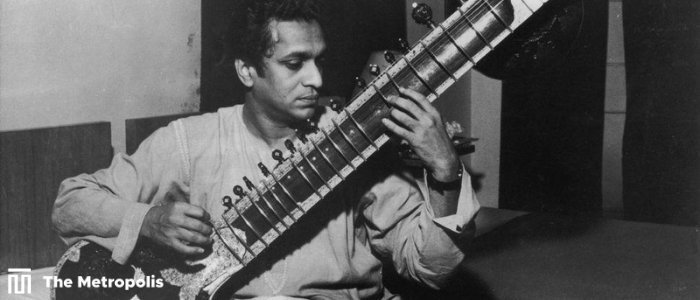Pandit Ravi Shankar. Photo: Collected-
Metropolis Desk-
Pandit Ravi Shankar, an Indian musician, sitar player, composer, and the leader of the National Orchestra of India, lived from 7 April 1920 until 11 December 2012.
Early Years
He was born in India on April 7, 1920. His father was a Middle Temple barrister and academic named Shyam Shankar Chowdhury. From 1927 to 1928, he attended Bengalitola High School in Benares. When he was ten years old, he travelled to Paris with his brother Uday Shankar’s dancing company. He joined the ensemble at the age of 13, went on trips with the others, and learned how to play a variety of Indian instruments.
Pandit Ravi Shankar: Career
Shankar studied the sitar for seven years under Ustad Allauddin Khan after quitting dance at the age of 18. He made his sitar debut in December 1939 while playing a jugalbandi (duet) alongside sitar virtuoso Ali Akbar Khan.
He moved to Mumbai after finishing his training and joined the Indian People’s Theatre Association, where he wrote the music for ballets in 1945 and 1946.
Soon after working from 1948 to 1956 as the All-India Radio’s music director, he started a string of European and American tours. When he was 25 years old, he rewrote the melody for the popular song “Sare Jahan Se Achcha.”
Shankar developed as the most well-known performer of Hindustani classical music during the course of his lengthy career. He collaborated with some of India’s most renowned percussionists while recording scores of hit albums. Shankar composed the music for the renowned Apu trilogy by Indian filmmaker Satyajit Ray. (1955–59). He oversaw the music for the Hindi films Godaan and Anuradha.
In 1962, he established the Kinnara School of Music in Mumbai, and in 1967, he established a second Kinnara School in Los Angeles. A few years later, both schools were shuttered as he lost interest in formal education.
Indian music was introduced to the West thanks to his performances with Yehudi Menuhin in the 1960s and his friendship with The Beatles’ lead guitarist George Harrison. He worked on the album Passages with Philip Glass and John Coltrane, two musicians who were affected by his composing approach. His involvement in both Indian classical music and Western music with Indian influences is particularly outstanding.
He is most known for his sitar and orchestra concerti, particularly Raga-Mala (“Garland of Ragas”).
He passed away in San Diego, California, USA, on December 11, 2012.
Pandit Ravi Shankar: Awards and Legacy
Generations of musicians continue to draw inspiration from Pandit Ravi Shankar, and future generations will remember his contributions to Indian classical music and cross-cultural dialogue.
He was awarded the Bharat Ratna in 1999, which is India’s highest civilian honour. In addition, he received India’s second- and third-highest civilian honors, the Padma Vibhushan in 1981 and the Padma Bhushan in 1967.
He received the Sangeet Natak Akademi Award in 1982 and Lifetime Achievement Award at the 55th Annual Grammy Awards in 2013. He won five Grammy Awards: Best Chamber Music Performance for West Meets East (with Yehudi Menuhin) in 1967; Album of the Year for The Concert for Bangladesh (with George Harrison) in 1973; Best World Music Album for Full Circle: Carnegie Hall 2000 in 2002; and Best World Music Album for The Living Room Sessions Pt. 1 in 2013.



